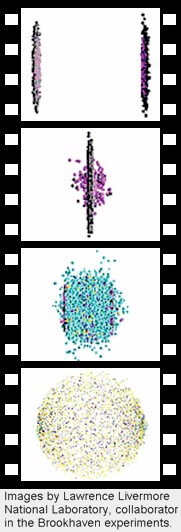 |
|
Physical change ratio rv due to absolute velocity va
The underlying cause of all the physical changes in B is the change in the
speeds at which quanta of energy move in the system. In the +x direction the speed of photons is
(1−va) ca and in the −x direction the speed is (1+va) ca.
In all directions perpendicular to the x axis the speed is the square root of
(1−va)·(1+va), which is the same as
(1−va ) ) . This is an important factor because it is the
ratio of a body's length in the direction of va to its at-rest length. It is the ratio of a clock's rate to its
at-rest rate. It is the ratio of a body's at-rest mass to its mass when moving through the qm with velocity va.
It is the ratio of the rate of round-trip energy exchange
in the body to the at-rest rate.
This "physical change ratio," caused by a body's absolute velocity, is represented by the symbol rv, where . This is an important factor because it is the
ratio of a body's length in the direction of va to its at-rest length. It is the ratio of a clock's rate to its
at-rest rate. It is the ratio of a body's at-rest mass to its mass when moving through the qm with velocity va.
It is the ratio of the rate of round-trip energy exchange
in the body to the at-rest rate.
This "physical change ratio," caused by a body's absolute velocity, is represented by the symbol rv, where
The following alignment chart shows that the physical change ratio for a body begins to change significantly
as the body's absolute velocity approaches that of light.
The film strip shows colliding gold nuclei which were accelerated to speeds
approaching that of light in the Relativistic Heavy-Ion Collider at Brookhaven National Laboratory. The gold
nuclei are foreshortened so the rate of round-trip energy exchange within the nuclei is isotropic, as it is
when the nuclei are at rest in the qm. The gold nuclei can be accelerated in opposite directions so that
their relative velocity is nearly 2 ca when they collide or pass one another.
According to orthodox physics theory, the gold nuclei are foreshortened in the
reference frame of the laboratory but not in the reference frames of the nuclei, and the velocity of the nuclei
relative to one another is less than the speed of light. Most physicists are comfortable with this way of thinking
because it works and they are accustomed to it. They are not concerned that they cannot explain the physical causes
of the foreshortening of the gold nuclei or the physical causes for a wide variety of related phenomena
including the observed constant speed of light, c.
|
|





